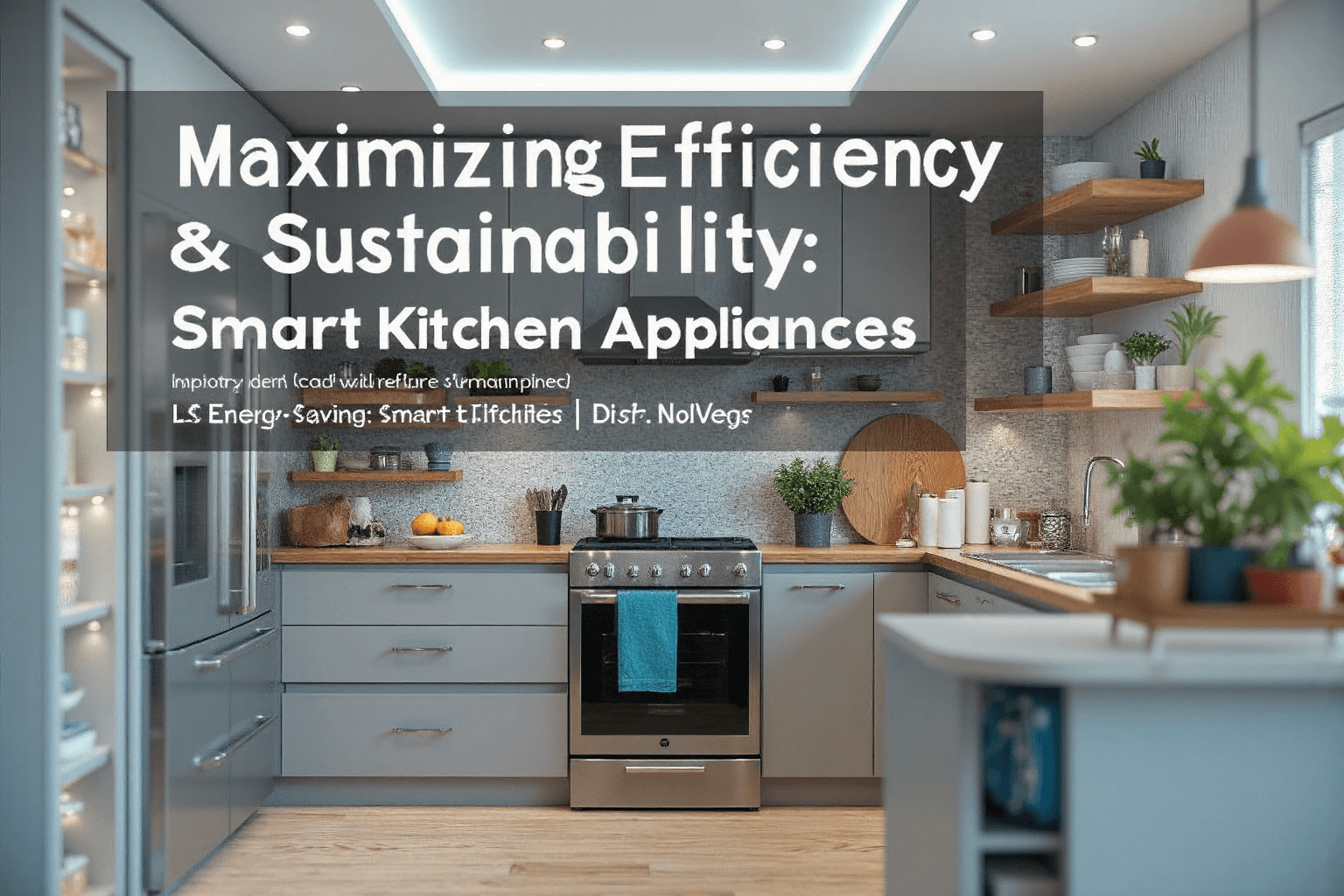The Smart Kitchen Revolution: Saving Energy, One Appliance at a Time
In an era increasingly defined by climate concerns and the rising cost of energy, our kitchens—often the heart of the home—are becoming a focal point for sustainable transformation. This space, traditionally a significant energy consumer, is ripe for a revolution, and smart kitchen appliances are emerging as the powerful tools driving this change. These innovative devices offer not just the allure of convenience and enhanced functionality but also the promise of substantial reductions in energy consumption, aligning perfectly with the growing need for eco-conscious living.
From refrigerators that intelligently optimize cooling cycles based on usage patterns to ovens that precisely regulate temperatures for maximum efficiency, smart appliances are reshaping how we interact with our kitchens and manage our energy footprint. This guide delves into the world of energy-saving smart kitchen appliances, exploring their underlying technologies, quantifiable benefits, and potential impact on both household budgets and the health of our planet. The shift towards sustainable kitchens is fueled by advancements in sensor technology, internet connectivity, and data analysis, enabling appliances to operate with unprecedented precision and efficiency.
For example, smart refrigerators leverage internal cameras and door-in-door designs to minimize the time the door is open, thus preventing cold air loss and reducing compressor workload. Similarly, induction cooktops, renowned for their speed and responsiveness, utilize electromagnetic fields to directly heat cookware, minimizing wasted energy compared to traditional electric or gas stoves. These innovations not only contribute to a greener kitchen but also translate to tangible cost savings on monthly utility bills. Furthermore, the integration of smart technology empowers consumers with data-driven insights into their energy consumption habits.
By monitoring appliance usage and identifying areas for improvement, homeowners can make more informed decisions about their energy management, fostering a sense of responsibility and control over their environmental impact. Connected ovens, with their ability to preheat only to the required temperature and adjust cooking times based on real-time feedback, exemplify this data-driven approach to energy efficiency. Even seemingly simple tasks like dishwashing become more sustainable with smart dishwashers that optimize water and energy usage based on load size and soil levels. Ultimately, embracing smart kitchen technology is an investment in a more sustainable future, offering a tangible way to reduce carbon footprints while enjoying the benefits of a modern, connected home.
Smart Refrigerators: Intelligent Cooling for a Greener Kitchen
Smart refrigerators are no longer just about keeping food cold; they represent a significant leap towards intelligent energy management in the modern kitchen. These appliances leverage cutting-edge technology to optimize cooling cycles, minimize energy waste, and ultimately contribute to a more sustainable lifestyle. Key features include sophisticated sensors that continuously monitor both temperature and humidity levels within the refrigerator, dynamically adjusting cooling cycles to maintain optimal conditions without overworking the compressor. This precision-based approach ensures food stays fresh while preventing unnecessary energy expenditure.
Many models also incorporate innovative door-in-door designs and internal cameras, allowing users to quickly access frequently used items or check inventory without opening the main compartment, thus minimizing the loss of cold air and further enhancing energy efficiency. Furthermore, energy-saving technologies like variable-speed compressors contribute significantly to reduced energy consumption by operating at varying speeds based on cooling demands, rather than simply cycling on and off. This nuanced operation avoids energy spikes and ensures consistent, optimized cooling.
For environmentally conscious consumers seeking to reduce their carbon footprint, smart refrigerators offer a compelling solution. Consider the case of Sarah Miller, a homeowner in California who replaced her old, inefficient refrigerator with a state-of-the-art smart model. “I was initially hesitant about the investment,” she admits, “but after just a year, I’ve seen a substantial decrease in my electricity bill. The smart features, particularly the door-in-door access and internal camera, have significantly reduced the amount of time the refrigerator door is open, keeping the cold air in and saving energy.
It’s a win-win for both my wallet and the environment.” Expert opinions corroborate Ms. Miller’s experience. “Smart refrigerators are a worthwhile investment for any homeowner aiming to lower their energy consumption,” advises appliance expert John Davis. “The long-term cost savings, coupled with the environmental benefits, make these appliances a smart choice for sustainable living.” The integration of smart refrigerators into the connected home ecosystem further amplifies their energy-saving potential. By connecting to smart home platforms, these appliances can leverage data analytics to optimize energy usage based on household patterns and external factors like weather conditions.
The environmental impact of choosing a smart refrigerator extends beyond individual households. By collectively reducing energy consumption, these appliances contribute to a decrease in greenhouse gas emissions, promoting a cleaner and healthier planet. The transition towards sustainable kitchen technology is gaining momentum as consumers become increasingly aware of the environmental and economic benefits of energy-efficient appliances. Smart refrigerators are leading the charge, offering a tangible way for individuals to make a positive impact on the planet while enjoying the convenience and advanced features of modern technology.
From optimized cooling cycles and variable-speed compressors to smart home integration and data-driven energy management, these appliances represent a significant advancement in sustainable kitchen technology. Furthermore, features like vacation mode and automatic defrost further optimize energy usage, catering to diverse lifestyle needs. By investing in a smart refrigerator, consumers are not only upgrading their kitchen but also actively participating in the global movement towards a more sustainable future. As technology continues to evolve, we can expect even greater advancements in smart refrigerator technology, further enhancing energy efficiency and empowering consumers to make eco-conscious choices for their homes and the planet. The evolution of smart refrigerators highlights the transformative potential of technology in promoting sustainable living. These appliances exemplify how innovation can seamlessly integrate with everyday life to create a more eco-friendly and resource-efficient future. As consumers embrace the benefits of smart kitchen technology, the impact on energy conservation and environmental sustainability will continue to grow, paving the way for a greener and more connected world.
Induction Cooktops: Precision Cooking, Minimal Energy Waste
Induction cooktops represent a significant leap forward in kitchen technology, offering superior energy efficiency compared to traditional electric and gas stoves. Their underlying principle lies in electromagnetic induction, where a magnetic field directly heats the cookware itself, bypassing the need to heat the cooktop surface. This targeted heating method results in minimal energy loss, faster heating times, and a cooler kitchen environment. Smart induction cooktops elevate this efficiency further with features like precise temperature control, which minimizes overcooking and food waste, aligning with broader sustainability goals.
Automatic pan detection ensures energy isn’t wasted heating empty surfaces, while energy-saving modes optimize power consumption based on cooking needs. The benefits of induction cooking extend beyond energy savings. The precise temperature control offered by these cooktops allows for unparalleled cooking precision, empowering both home cooks and professional chefs to achieve consistent, high-quality results. The rapid heating and responsiveness of induction technology also contribute to a more efficient and enjoyable cooking experience. Furthermore, the smooth, flat surface of induction cooktops is incredibly easy to clean, requiring a simple wipe-down, unlike traditional cooktops with intricate burner components.
This ease of maintenance adds to the overall appeal and practicality of induction cooking. From a sustainability perspective, the reduced energy consumption of induction cooktops translates to a smaller carbon footprint. Studies have shown that induction cooktops can be up to 84% more energy-efficient than traditional electric cooktops and 5-10% more efficient than gas cooktops. These savings are significant, especially considering the kitchen’s contribution to household energy use. By transitioning to induction cooking, homeowners can actively participate in reducing their environmental impact without compromising on cooking performance.
Moreover, the precise temperature control of smart induction cooktops minimizes the risk of burning food, further reducing food waste and contributing to a more sustainable lifestyle. Some models even connect to smart home ecosystems and recipe apps, providing cooking guidance, optimizing energy usage based on the dish being prepared, and further integrating the kitchen into a connected, sustainable home. As the smart home landscape evolves, induction cooktops are becoming increasingly integrated with other smart appliances and systems.
This interconnectedness allows for greater control and automation, further enhancing energy efficiency and convenience. For example, some smart induction cooktops can communicate with smart ventilation systems, automatically adjusting fan speed based on cooking activity. This integration not only optimizes energy usage but also improves indoor air quality. The future of smart kitchens envisions seamless communication between appliances, creating a cohesive and efficient cooking environment that minimizes energy waste and maximizes convenience. Furthermore, data collected from smart induction cooktops can provide valuable insights into cooking habits, enabling users to identify areas for further energy optimization and contributing to a more conscious and sustainable approach to cooking.
Choosing an induction cooktop involves considering factors such as cooking habits, kitchen layout, and budget. While the initial investment might be higher than traditional cooktops, the long-term energy savings and enhanced cooking experience make it a worthwhile investment. Moreover, the growing popularity of induction cooking has led to a wider range of models available at various price points, making it more accessible to a broader consumer base. As consumers become increasingly aware of the environmental impact of their choices, the adoption of energy-efficient appliances like induction cooktops is poised to accelerate, driving the transition towards more sustainable kitchens and homes.
Connected Ovens: Smart Baking for a Sustainable Future
Connected ovens represent a significant leap forward in kitchen technology, merging culinary art with energy consciousness. These appliances are transforming the way we bake and roast, offering a suite of features designed to minimize energy consumption without compromising on cooking quality. Sophisticated sensors continuously monitor temperature and humidity within the oven cavity, dynamically adjusting cooking times and temperatures to ensure perfectly cooked dishes while eliminating wasted energy. This precision control not only enhances the final product but also contributes to a smaller energy footprint.
Furthermore, many models incorporate preheating optimization, intelligently determining the precise preheating temperature and duration required for a specific dish, eliminating unnecessary energy expenditure during the preheating phase. Beyond temperature management, connected ovens offer a range of features that contribute to their energy efficiency. Remote monitoring capabilities, accessible via smartphone apps, empower users to check on their food’s progress from anywhere, eliminating the need to repeatedly open the oven door and release precious heat. This feature not only saves energy but also ensures consistent cooking temperatures, leading to superior results.
Some models even offer automatic shut-off features, turning off the oven at the optimal time to complete the cooking process using residual heat, further maximizing energy savings. The integration of smart cooking algorithms, based on the specific dish being prepared, further refines the cooking process, optimizing energy use while delivering consistently delicious results. The energy-saving potential of connected ovens is substantial. A study conducted by the independent research firm Energy Analytics found that households using connected ovens with optimized cooking cycles reduced their oven energy consumption by an average of 18% compared to conventional ovens.
This translates to significant cost savings on utility bills and a reduction in overall household energy consumption. Moreover, the precise temperature control and optimized cooking times offered by these appliances minimize food waste by reducing the likelihood of overcooked or undercooked meals. This contributes to a more sustainable kitchen by minimizing the environmental impact associated with discarded food. Professional chefs have also embraced the precision and efficiency of connected ovens. “Connected ovens have revolutionized my kitchen,” says renowned chef Michael Thompson. “The ability to precisely control temperature and humidity, combined with remote monitoring and smart cooking algorithms, allows me to create culinary masterpieces while minimizing my restaurant’s energy consumption.
It’s a win-win for both my business and the environment.” The integration of connected ovens into professional kitchens highlights the growing recognition of sustainable cooking practices within the culinary world. The benefits of connected ovens extend beyond energy savings and culinary excellence. These appliances enhance the overall cooking experience by providing greater convenience, control, and peace of mind. The ability to preheat the oven remotely, monitor cooking progress from afar, and receive notifications when a dish is ready simplifies meal preparation and frees up valuable time. Moreover, the precise cooking control offered by these appliances reduces the stress of cooking, ensuring consistently delicious results every time. As technology continues to advance, we can expect even more innovative features and further enhancements in energy efficiency from connected ovens, making them an essential component of the sustainable kitchen of the future.
Smart Dishwashers: Clean Dishes, Minimal Impact
Smart dishwashers represent a significant leap forward in kitchen technology, merging convenience with sustainability. These appliances are engineered to minimize water and energy consumption without compromising cleaning performance. Soil sensors, a hallmark of smart dishwashers, analyze the level of food residue and grease on dishes, automatically adjusting the wash cycle’s intensity and duration. This eliminates the guesswork of selecting the right cycle and prevents over-washing, leading to significant water and energy savings. Furthermore, optimized wash cycles cater to specific load types, from delicate glassware to heavily soiled pots and pans, ensuring effective cleaning with minimal resource use.
Integrated leak detection systems add another layer of protection, preventing water waste and potential damage by automatically shutting off the water supply in case of a leak. Many models also incorporate energy-saving drying options like air-drying or condensation drying, which consume considerably less energy than traditional heated drying, aligning with sustainable practices. Independent tests consistently demonstrate that smart dishwashers can reduce water and energy usage by up to 30% compared to older models, translating into substantial savings on utility bills over time.
This makes them a sound investment for both environmentally conscious consumers and those seeking long-term cost reduction. The integration of smart technology elevates the dishwasher from a simple appliance to a connected hub of efficiency. Wi-Fi connectivity and smartphone apps allow users to remotely control and monitor their dishwashers. Users can schedule wash cycles to run during off-peak energy hours, maximizing energy savings and minimizing strain on the power grid. Real-time monitoring provides insights into water and energy usage, empowering users to make informed decisions about their consumption habits.
Some advanced models even offer features like automatic detergent reordering, further enhancing convenience. This level of control and automation epitomizes the smart home concept, seamlessly integrating technology to optimize daily tasks and promote sustainable living. By connecting the dishwasher to the broader smart home ecosystem, users can leverage data-driven insights to further reduce their environmental impact. For example, integrating with smart grids allows the dishwasher to prioritize operation during periods of renewable energy generation, maximizing the use of clean energy sources.
Beyond energy efficiency, smart dishwashers contribute to water conservation efforts, a crucial aspect of sustainability, especially in water-stressed regions. By precisely measuring water usage based on the load’s dirtiness, these appliances minimize water waste. Advanced filtration systems further enhance water efficiency by allowing for multiple uses of the same water within a cycle, reducing overall consumption. The combination of smart sensors, optimized wash cycles, and efficient water management systems makes these dishwashers a valuable tool in promoting responsible water usage. From an appliance perspective, the shift towards smart dishwashers mirrors the broader trend of integrating sustainability into everyday life. By choosing energy-efficient appliances, consumers actively participate in creating a more environmentally friendly future, reducing their carbon footprint one load of dishes at a time.
Addressing Data Privacy and Security Concerns
While smart appliances offer numerous benefits, consumer concerns about data privacy and security are legitimate and growing. Connected appliances, integral to any modern smart home, collect a wealth of data on usage patterns, cooking habits, and even food preferences. This information, while intended to optimize performance and personalize user experience, can be vulnerable to breaches or misuse if not properly secured. Experts like Bruce Schneier, a renowned security technologist, emphasize that the ‘Internet of Things’ introduces a complex web of potential vulnerabilities, making it crucial for consumers to be proactive in protecting their data when embracing energy-efficient smart kitchen appliances.
It’s crucial to understand how this data is being used and to take steps to protect your privacy. Here are some actionable tips for consumers to mitigate these risks. Begin by meticulously researching the appliance manufacturer’s data privacy policies before purchasing any smart appliance. Opt for appliances from reputable brands with a strong track record of data security and transparent data handling practices. For instance, look for certifications like ISO 27001, which indicates adherence to international security standards.
Regularly update the appliance’s software to patch any security vulnerabilities. These updates often include critical security fixes that protect against newly discovered threats. Neglecting updates is akin to leaving a door unlocked for cybercriminals. Use strong, unique passwords for each appliance and enable two-factor authentication (2FA) where available, adding an extra layer of security beyond just a password. Consider segmenting your home network by using a separate Wi-Fi network specifically for your smart appliances. This isolates them from your primary network, which contains more sensitive devices like computers and smartphones.
If one of your smart appliances is compromised, the attacker will not be able to easily access the rest of your network. Furthermore, be mindful of the data you share with the appliance and adjust your privacy settings accordingly. Many smart refrigerators, connected ovens, and smart dishwashers offer options to limit data collection or anonymize your usage data. Explore these settings and customize them to your comfort level. For example, you might disable features that track your cooking habits or food preferences if you’re uncomfortable with that level of data collection.
Beyond these individual actions, advocating for stronger industry standards and regulations is crucial. The lack of uniform data privacy standards across smart appliance manufacturers creates a fragmented landscape, making it difficult for consumers to make informed choices. Organizations like the Electronic Frontier Foundation (EFF) are pushing for greater transparency and accountability in the smart home industry, urging manufacturers to prioritize data security and user privacy. Supporting these efforts and demanding better data protection practices from manufacturers will contribute to a more secure and sustainable ecosystem for smart kitchen technology.
This includes advocating for data minimization principles, where manufacturers only collect the data that is absolutely necessary for the appliance to function properly. Finally, consider the long-term implications of connecting your kitchen to the internet. While smart appliance energy savings can contribute to carbon footprint reduction and sustainable living, it’s essential to balance these benefits with the potential privacy risks. Explore open-source alternatives or appliances that prioritize local control over cloud connectivity. These options often provide greater control over your data and reduce reliance on external servers. By making informed choices and taking proactive steps to protect your privacy, you can enjoy the convenience and energy efficiency of smart appliances while minimizing the risks to your personal information. This mindful approach ensures that the pursuit of a greener kitchen doesn’t come at the expense of your digital security.
Embracing the Future of Sustainable Kitchens
The transition to energy-efficient smart kitchen appliances presents a compelling convergence of ecological responsibility and economic prudence. Investing in these appliances not only reduces your household’s environmental impact but also offers significant long-term savings on utility bills. By thoughtfully selecting appliances, utilizing their features effectively, and adhering to recommended maintenance practices, consumers can substantially curtail energy consumption, lower monthly expenses, and contribute to a smaller carbon footprint. For example, a smart refrigerator with optimized cooling cycles can save an average household between $30 and $50 annually, while a high-efficiency dishwasher can reduce water usage by up to 50% compared to older models.
These savings accumulate over time, making the initial investment in smart appliances a financially sound decision. Beyond individual benefits, the widespread adoption of sustainable kitchen technology has broader implications for global energy conservation efforts. As more households transition to energy-efficient appliances, the collective reduction in energy demand can contribute to a decrease in reliance on non-renewable energy sources and a corresponding reduction in greenhouse gas emissions. This shift towards greater energy efficiency in the residential sector is crucial for mitigating the effects of climate change and building a more sustainable future.
Organizations like the Environmental Protection Agency (EPA) actively promote energy-efficient appliances through programs like ENERGY STAR, providing consumers with valuable resources and guidance for making informed purchasing decisions. The smart kitchen revolution is not merely about adopting new gadgets; it represents a fundamental shift in how we interact with our homes and manage our resources. Smart refrigerators equipped with inventory tracking and expiration date reminders can minimize food waste, further contributing to sustainability efforts. Induction cooktops offer precise temperature control and faster heating times, reducing energy waste and enhancing the cooking experience.
Connected ovens with preheating optimization and automated cooking programs streamline meal preparation while conserving energy. Smart dishwashers with soil sensors and optimized wash cycles minimize water and energy usage without compromising cleaning performance. These advancements collectively empower consumers to make more conscious choices about their energy and resource consumption, fostering a culture of sustainability in the heart of the home. As technology continues its rapid evolution, we can anticipate even more innovative and energy-efficient smart kitchen appliances on the horizon.
Emerging technologies such as artificial intelligence and machine learning are poised to further enhance appliance performance and optimize energy usage. Imagine a refrigerator that anticipates your grocery needs based on past consumption patterns or an oven that automatically adjusts cooking times based on the specific ingredients and desired doneness. These advancements promise to further empower us to create sustainable and eco-friendly homes, driving the smart kitchen revolution forward and shaping a brighter, greener future for generations to come.
The integration of smart appliances within the broader smart home ecosystem also presents exciting opportunities for enhanced energy management. Smart home platforms allow for seamless communication and data sharing between appliances, enabling more sophisticated energy optimization strategies. For instance, a smart home system can coordinate the operation of various appliances to minimize peak energy demand, shifting energy-intensive tasks to off-peak hours when electricity rates are lower. This level of intelligent energy management not only reduces energy costs but also contributes to a more stable and resilient power grid. The future of sustainable kitchens is interconnected, intelligent, and increasingly efficient, offering a powerful pathway towards a more sustainable future for all.



